
How a college student lives a zero waste lifestyle
What do you know about the Zero Waste lifestyle? You have probably heard about people who promote sustainability at least once in your life. Zero Waste is a movement which has received a lot of media attention, especially due to climate change and the ongoing ecological catastrophe caused by plastic. But what does it actually take to live a mindful life with zero waste? Is it possible to survive the struggle of reorganizing your life habits if you are still a student? And how expensive is it to do good for the environment? In our talk with Miah Ke-leigh, a third year Tilburg University Online Culture student, she answers the questions that you were curious about but didn't know where to ask.
Screen Shot 2018-11-09 at 16.04.07.png
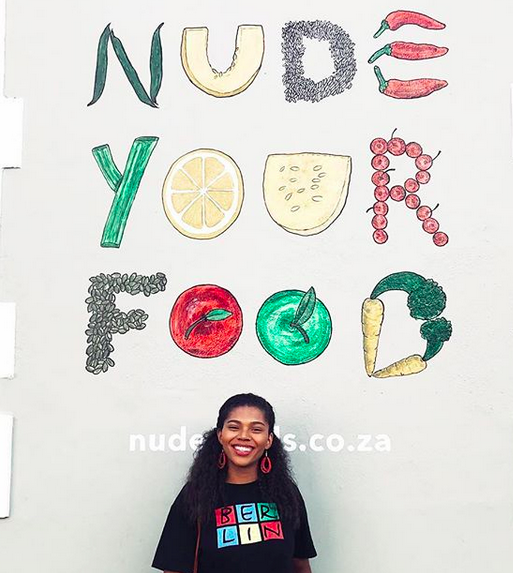
Hey Miah! Could you tell us, how did it feel ‘going’ zero waste?
In essence, a zero waste lifestyle is about trying to create as little waste as possible. To me, the "zero" bit shouldn't be there, because a world without waste would never exist. This is a design flaw that I wanted to tackle; I had already been interested in sustainability. But it wasn't until after I watched Lauren Singer's Ted Talk about how she fit 5 years worth of trash into a mason jar that I was actually inspired to do something.
"I had so many things I didn't need nor necessarily want that was taking up so much space."
I had so many things I didn't need - nor necessarily even want - that was taking up so much space in my apartment. There were clothes I never wore and items that were nice to have, but added no value to my life. I recognized it was time for a change, so I donated everything I never used. This largely consisted of clothes and books which were either donated or recycled. I also had a lot of makeup as I used to be a beauty blogger, so I ended up giving away about four boxes worth of beauty products to women's shelters, roommates or family members. Gradually, I started switching to sustainable alternatives. For example, once it was time to get a new toothbrush, I purchased one made from bamboo which I can recycle and compost - unlike the conventional plastic ones. I also bought a reusable water bottle that I can fill up for free instead of constantly spending money on plastic ones. These were small and easy changes that was helping me live more sustainably and in many ways, ethically too.
What inspired you to take the first step towards this lifestyle?
My passion for sustainability started during a 2015 trip to Costa Rica, where I was part of a volunteer program with Ecology Project International (EPI). They taught us so much about sustainable living and how to manage valuable resources. But it was difficult maintaining those habits when I returned to the Netherlands. That's when I started researching and came across Lauren Singer's TedTalk. This made me rethink my lifestyle and I opted to make more eco-friendly choices. Obviously as college student, shopping sustainably is expensive but that's only because the items you are buying were made ethically and the people behind the company are actually earning a living wage. It isn't always feasible, so I do what I can by using what I have. I created an Instagram account to track my journey and through that I have connected with so many people and learned so much about what I can do to make this lifestyle easier.
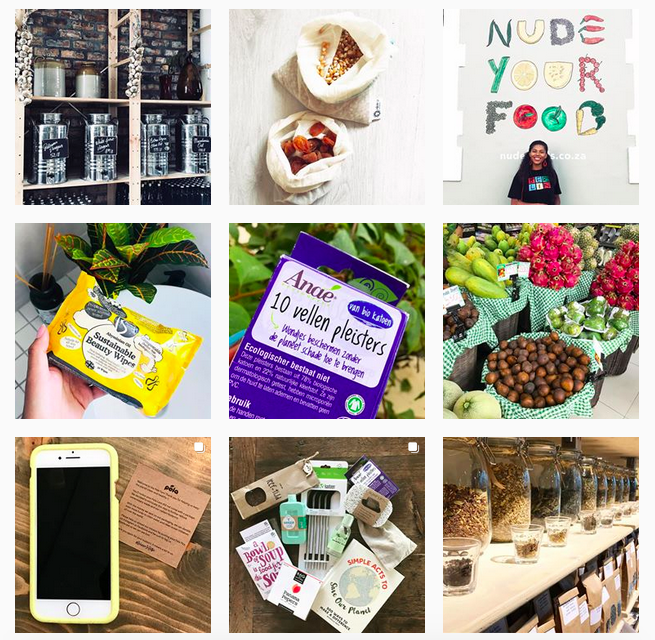
Tracking The Journey
I was shocked at the ethics of the brands I was supporting, as well as how much we waste on a regular basis.
What was the hardest thing you have experienced on the way to the zero waste lifestyle?
To live a zero waste lifestyle is actually not difficult at all. The difficult part is getting rid of habits you've created over the years and dealing with negativity towards this lifestyle, as some people don't think there's a point. However, I'm doing what I can to reduce my impact and there's a large sustainable community out there. By making simple changes, I also started living more ethically. That was the most rewarding step, as I was really informing myself about what I was supporting every time I chose to buy something. My argument is always that people keep waiting for others to step up and create a change. I honestly think if people started being the person they waited for to create the change they wanted, we'd get more stuff done in half the time. That's basically how I became that 'somebody' that I was waiting for in order to create a change I wanted.
Was it hard to abandon some items? For example, makeup, toiletries etc?
I didn't think of it as me abandoning items, I thought of it as me being more mindful. The Netherlands has a bunch of stores where I order alternatives and in Cape Town, South Africa (where I am from) there are a ton of zero waste options. The best part is most Dutch stores are easy to access online and almost all of them deliver your purchases in recyclable packaging. I've been committed to being zero waste for the past year and a half now, but I still have some plastic toiletries to go through. Everything else I have found an alternative for. Shampoo in a plastic bottle? Shampoo soap bar. Disposable razor? Safety razor. Toothbrush? Compostable bamboo toothbrush. You get the point. Of course, every now and then I mess up and purchase items in plastic packaging out of convenience - like just the other day I bought toothpaste at Albert Heijn because ordering a zero waste alternative online would have taken too long. It all comes down to preparation. The only two areas of my life where I am not completely zero waste is makeup and female hygiene products. Since I used to be a beauty blogger, I had accumulated a lot of makeup over the years. Now, every makeup item I own is vegan or cruelty-free and some products have sustainable packaging, which I can compost or recycle afterwards. However, a majority of it is still in plastic. As for hygiene products, the thought of using a menstrual cup isn't very comforting but maybe I'll take the step one day.
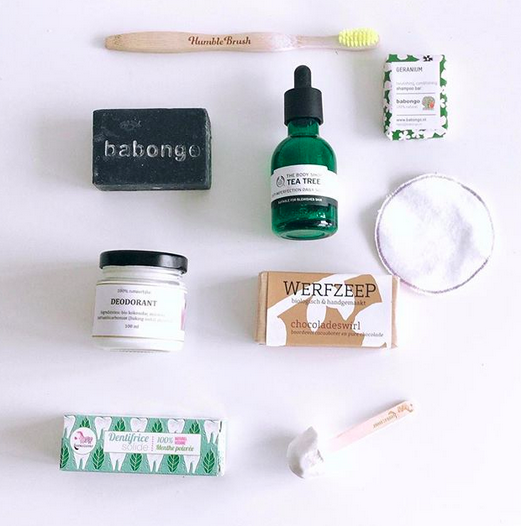
Low Waste Toiletries
It takes a while to adjust, but once you get into the swing of things and remember why you're doing it, it becomes a lot easier to control.
As far as I know, such changes do not happen overnight. How much time did it take to adjust your life to the zero waste lifestyle?
It comes down to the five rules of zero waste; refuse, reduce, reuse, recycle and rot. Refuse what you don't need, reduce your impact, reuse items and recycle what you can. Rot is the most challenging rule as it applies to food and not everyone has access to a compost bin. It's a personal journey, depending on how much you're willing to commit. I often get questions about how this would impact a family, for instance. There are many families who document their zero waste journey online, so it is possible. The same rules apply in terms of making sustainale switches, though there's definitely more steps you'd have to take for smaller children. This means mostly excluding plastic, with examples being cloth diapers compared to conventional plastic, toys made from wood, investing in a reusable water bottles etc. It takes time to adjust and it isn't always affordable depending on your personal wants, but once you get into the swing of things and remember why you're doing it, it becomes a lot easier to control.
What are the essential items in your reusable 'kit'? Is there something you take with you everywhere you go?
I started off by owning a lot of reusables such as a reusable bag for grocery shopping at the local market, water bottle, straw, and a coffee cup (Starbucks on campus has a cheap recyclable one which you can purchase and it takes 30 cents off of your oder). I also own a first aid kit that contains compostable band-aids to avoid plastic waste.

Sustainable Festival Preparation
How do people react when you tell them about zero waste?
It's a mixture of curiosity, admiration and confusion. Many people want to know more about it or have a lot of questions. Others compliment me for trying not to create waste and some criticize because they don't fully understand. It's a different reaction every time.
I used to have so much and I wanted to have even more but one day I just thought, "if I'm not satisfied with what I have now, what makes me think I'll be happy with even more?"
What are the advantages and disadvantages of the zero waste lifestyle?
I used to have so much and I wanted to have even more but one day I just thought, "if I'm not satisfied with what I already have, why would I be happy with more?" I now know what I need and what adds value to my life. Of course, I have a few things I don't really need, but I'm trying to reduce waste. The only disadvantage is the amount of negative reactions I get. Most people think it's something they can't do or I get a lot of judgement for it. I definitely understand it takes motivation (and time) to commit. It's not for everyone, but it can be if you're open to learning. Once you get into it, you begin to discover that it's not just about reusable alternatives, but also about ethics as this movment includes placing people above profit. The best part for me was that I became a lot healthier; mentally and physically. Everyone can make small changes to their lifestyle. You don't have to be vegan, plastic free or only shop at sustainable stores. You just have to be conscious.
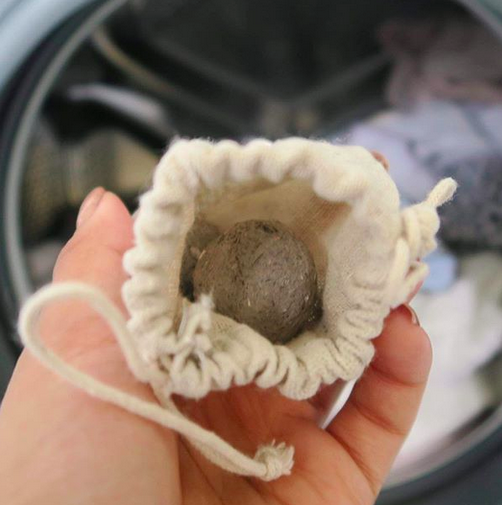
Sustainable Laundry Alternatives
With the money I saved, I was able to pay the €300 required to travel to Sweden for my study association's annual Study Trip in March of 2018.
Does zero waste help saving money?
Some things worth investing in are reusable straws and good quality water bottles. That can be expensive. Toiletries and food are a lot cheaper, especially in bulk. Sometimes zero waste items are a little pricier because there may not be a high demand for it , but considering you're reusing and not rebuying all the time, I think it is worth it. One extreme example I can give of how much money I've saved is how I was able to pay the €300 required to travel to Sweden for my study association's annual Study Trip in March of 2018. This covered flight and hostel costs and I still had enough money left for night clubs (one even had a €15 entrance fee!), shopping, food and drinks - yet I still had a ton of money left over after the trip. It was great to see what a difference it has made financially, especially since I am a student.
Some foods are sold packed in plastic, how do you manage avoiding it? Do you have any food waste at all?
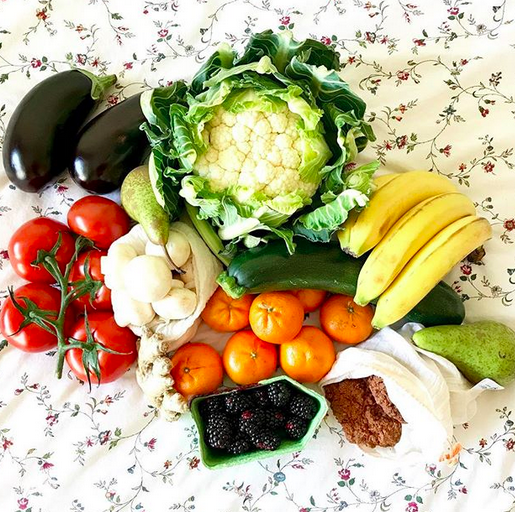
Grocery Shopping at The Farmers Market
Grocery shopping in a supermarket is like living in a Stephen King novel. I avoid it by buying items packaged only in recyclable materials such as glass, cardboard or metal. Fruit and vegetables I put in my reusable cotton bag. Sadly I still get the sticker when I weigh it, so that goes to landfill as eco-bricking isn't a thing here in the Netherlands. I buy pasta and chocolate in paper packaging, so I can recycle it. Since we don't have many bulk stores, I create waste by buying almond milk and vegetarian meat. The packaging of boxed milk is lined with plastic which makes recycling difficult and the meat is packaged in plastic too. These are the only two items of food that I buy in non-zero waste packaging. I also tend to grocery shop at local markets, where I can bring my own bags, save money and avoid stickers. I will admit I have a huge sweet tooth. When I am with friends my plastic waste increases, so I try to buy bulk candy at Jamin as I can avoid stickers and use my reusable bags instead of the plastic ones they provide.
There are a lot of Dutch locals who live zero waste! It's so interesting because I have discovered so many places and alternatives to shop at here in the Netherlands.
How well-known is the zero waste movement in the Netherlands?
There are a lot of Dutch locals who live zero waste! It's so interesting because I have discovered so many places and alternatives to shop at here in the Netherlands. Many people are interested in the movement and there are a lot of social media accounts which offer advice, suggestions for plastic-free living, cool secondhand stores to buy from or stores you can donate to. I think many people start off by secondhand shopping for books and clothes in the beginning, as the impact of climate change and global warming has really allowed for a lot of people to rethink their choices and habits. Our actions have such an enormous impact on the environment. For example, to make one t-shirt it takes almost 3000 litres of water. For one kilogram of beef to make burger patties, it takes between 5,000 to 20,000 litres of water. These are just two of many statistics that show how hard it affects the earth and our natural resources. So it's awesome to see people taking responsibility by going second-hand shopping or participating in Meat Free Mondays (meaning you don't consume meat - this includes fish - on Mondays) or Meatless May, where you are vegetarian for the whole month of May.
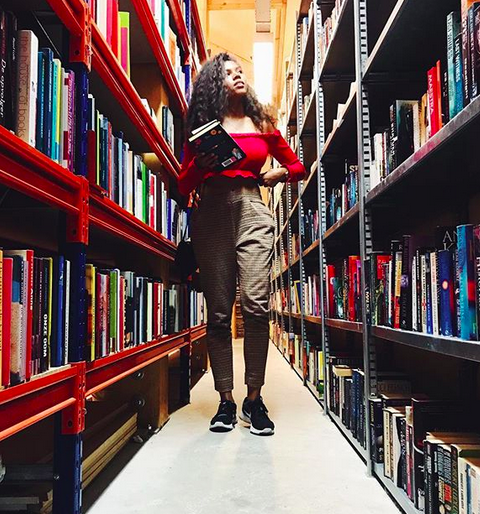
2nd Hand Bookstore in Utrecht
To make one t-shirt it takes almost 3000 litres of water. For one kilogram of beef to make burger patties, it's between 5000 - 20,000 litres of water. These are just two of many statistics that show how hard it affects the earth and our natural resources
More people are interested in reducing their waste and helping our planet. What advice would you give to those, who are considering ‘going’ zero waste?
- Youtube is a wonderland of resources. Search Freya Haley, Kristen Leo, Hitomi Mochizuki and Gittemary.
- Stop spending your money on plastic water bottles when you can buy a reusable one and fill it up for free.
- Browse the websites I mentioned and shop sustainable alternatives.
- Bring your own bag to stores.
- Reduce (red) meat consumption.
- Recycle.
- Donate items you no longer wear or better yet, attend Clothing Swap events with friends.
- Opt for a reusable straw or no straw if you can.
- Turn the tap off when you brush your teeth.
- Get a compostable toothbrush and try to take shorter showers.
You don't have to jump into the deep end straight away - progress is progress no matter how small.
Thank you for talking to me today Miah! I think many of our readers will open something new about Zero Waste after this interview!
References
T. (2015, May 27). Why I live a zero waste life | Lauren Singer | TEDxTeen. Retrieved from https://www.youtube.com/watch?v=pF72px2R3Hg
K. (2018, September 26). Fast Fashion Explained In Under 5 Minutes. Retrieved from https://www.youtube.com/watch?v=fR7bXsoNwwE
Home. (n.d.). Retrieved from https://www.goingzerowaste.com/
X (n.d) FAQ. Retrieved from http://www.hetzerowasteproject.nl/search/label/FAQ
Youtube Videos:
1. https://www.youtube.com/watch?v=pF72px2R3Hg [Why I Live A Zero Waste Lifestyle by Lauren Singer]
2. https://www.youtube.com/watch?v=OagTXWfaXEo [10 Ways To Reduce Your Waste By Lavendaire]
3. https://www.youtube.com/watch?v=fR7bXsoNwwE [Fast Fashion Explained In Under 5 Minutes by Kirsten Leo]
4. https://www.youtube.com/watch?v=q2shLiL6l50 [Zero Waste On A Budget by The Girl Gone Green]